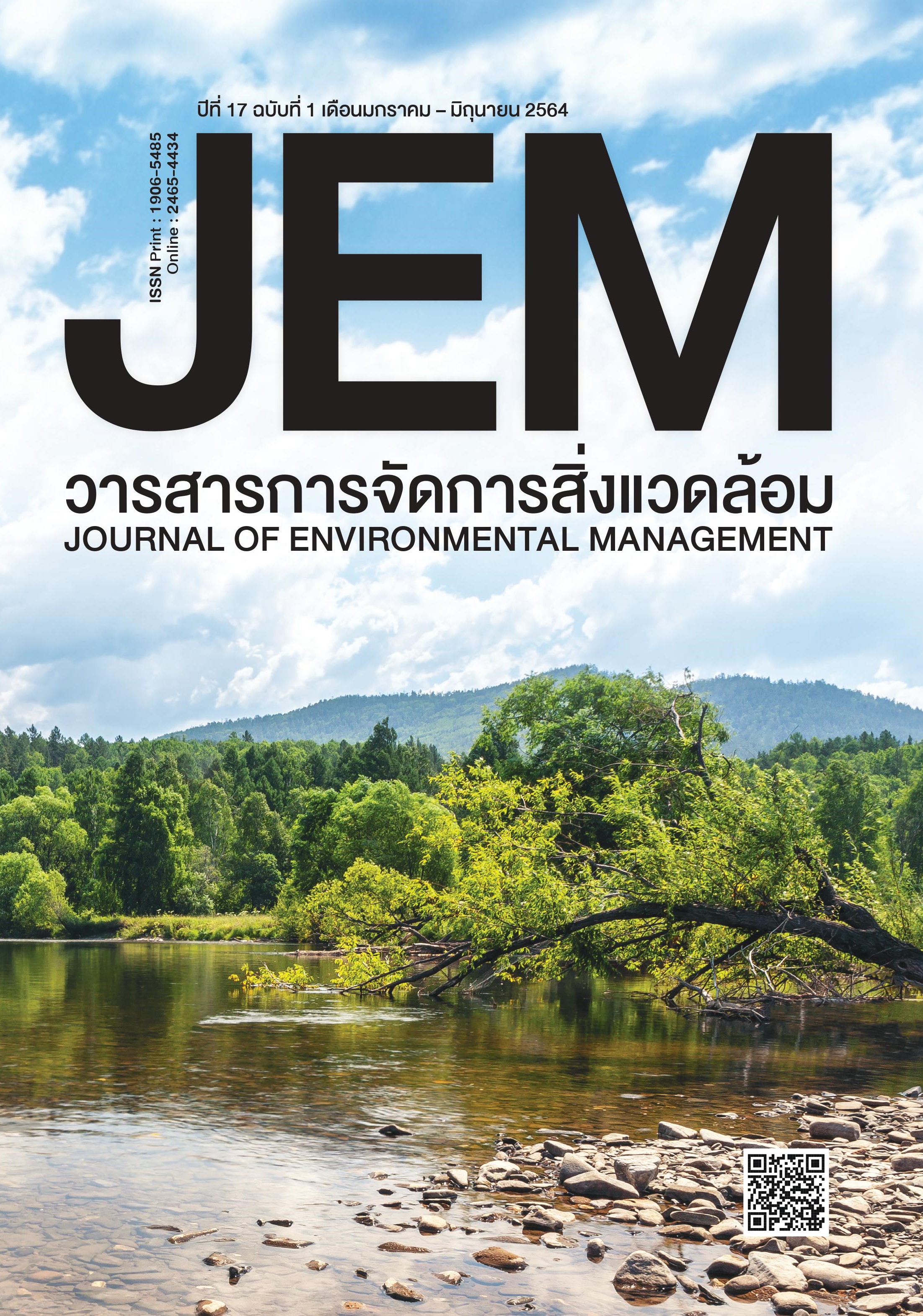การวิเคราะห์ปัจจัยเพื่อเสนอกลยุทธ์การบริหารจัดการการลดและคัดแยกขยะของกรุงเทพมหานคร
DOI:
https://doi.org/10.14456/jem.2021.1คำสำคัญ:
การบริหารจัดการ, กลยุทธ์การลดและการคัดแยกขยะ, กรุงเทพมหานครบทคัดย่อ
การวิจัยนี้ทำการศึกษาวิเคราะห์ปัจจัยที่เกี่ยวข้องเพื่อเสนอกลยุทธ์การบริหารจัดการการลดและคัดแยกขยะของกรุงเทพมหานคร โดยเก็บรวบรวมข้อมูลจากการศึกษาเอกสาร การสังเกตการณ์แบบมีส่วนร่วม และการสัมภาษณ์ผู้บริหารและบุคลากรของกรุงเทพมหานครที่เกี่ยวข้อง วิเคราะห์ข้อมูลด้วย SWOT analysis สำหรับการวิเคราะห์ปัจจัยภายในและปัจจัยภายนอกที่เกี่ยวข้อง TOWS matrix สำหรับการเสนอยุทธศาสตร์ และ Input-Process-Output: I-P-O model สำหรับการจัดทำข้อเสนอระบบที่เหมาะสมของการบริหารจัดการการลดและคัดแยกขยะของกรุงเทพมหานคร ผลการศึกษาพบว่าปัจจัยภายใน ประกอบด้วยการมีแผนงานและกลยุทธ์ที่ชัดเจน โครงสร้างบริหารงานที่เหมาะสม การกำหนดให้การลดและคัดแยกขยะเป็นนโยบายสำคัญ การกำหนดผู้รับผิดชอบให้ชัดเจน การพัฒนาบุคลากร การบริหารจัดการเชิงบูรณาการ การบังคับใช้กฎหมาย และการสร้างค่านิยมร่วมของข้าราชการ ปัจจัยภายนอก ประกอบด้วย นโยบายของรัฐบาลที่ชัดเจน ความรับผิดชอบต่อการจัดการของเสียของผู้ผลิต ความเข้มแข็งของธุรกิจวัสดุนำกลับมาใช้ใหม่ ความตระหนักของประชาชนต่อคุณค่าของขยะว่าคือทรัพยากรและการคัดแยกขยะและการมีส่วนร่วมของภาครัฐและภาคเอกชน การสร้างการรับรู้แก่ประชาชน การใช้ประโยชน์จากขยะอินทรีย์ และการพัฒนากฎหมาย และข้อเสนอกลยุทธ์ประกอบด้วย การประกาศนโยบายการจัดการขยะเป็นวาระกรุงเทพมหานคร การสร้างเครือข่ายความร่วมมือภาครัฐกับภาคเอกชน การส่งเสริมธุรกิจวัสดุนำกลับมาใช้ใหม่ การปรับปรุงระบบเก็บขยะแยกประเภท การสร้างความรู้และความตระหนักแก่ประชาชนให้รู้คุณค่าขยะว่าเป็นทรัพยากรและรู้วิธีการคัดแยกขยะ การพัฒนาบุคลากร และบังคับใช้กฎหมายที่เกี่ยวข้องอย่างจริงจัง
เอกสารอ้างอิง
BMA, Department of Planning and Urban Development (2007). Singapore Study Visit Waste ManagementStudy Report 2007 [In Thai]. Retrieved from http://bangkok.go.th/environmen.
BMA, Environment Department. (2006). California’s zero-waste [In Thai]. Retrieved from http://bangkok.go.th/environment.
BMA, Environment Department. (2007). Brazil Study Visit Waste Management Study Report 2007 [In Thai]. Retrieved from http://bangkok.go.th/environmen.
BMA, Environment Department. (2019). Bangkok State of Environment 2017-2018 [In Thai]. Bangkok: Akson Thai Printing Ltd., Part.
BMA, Policy and Planning Department. (2002). The Sixth Bangkok Metropolis Development Plan 2002-2006 [In Thai]. Bangkok: Policy and Planning Department.
BMA, Strategy and Evaluation Department. (2005). Government Administration Plan for Bangkok 2005-2008 [In Thai]. Bangkok: Strategy and Evaluation Department.
BMA, Strategy and Evaluation Department. (2013). The 20-year Development Plan for Bangkok Metropolis 2013-2032 [In Thai]. Bangkok: Strategy and Evaluation Department.
Bonciu,F. (2014). The European Economy: From a Linear to a Circular Economy. Retrieved from https://heinonline.org/HOL/Page?collection=journalsandhandle=hein.journals/rojaeuf14 andid=335andmen_tab=srchresults.
Bush, T. (2019). Internal and External Analysis in Strategic Management (SWOT and PESTLE). Retrieved from https://pestleanalysis.com/internal-and-external-analysis-in-strategic-management.
Chamlong Poboon. (2014). Environmental assessment [In Thai]. Bangkok: Bangkokblock.Chantasorn, W. (2008). An integrated theory of public policy implementation [In Thai]. Bangkok: Thai University Research Associates.
Connett, P. (2007). Zero waste: a key Move towards a Sustainable Society. Retrieved from https://www.researchgate.net/publication/228871831Zero_Waste_A_Key_Move_towards_a_Sustainable_Society.
European Commission. (2015). Communication from the commission to the European parliament, the council, the European economic and social committee and the committee of the regions, Towards a circular economy: A zero waste program for Europe. Retrieved from https://eur-lex.europa.eu/legal-content/EN/ALL/?uri=COM:2015:614:FIN.
Field, B. C., & Field, M. K. (2012). Environmental economics: An introduction. New York: McGraw-Hill Education.
Leblanc, R. (2019). Integrated Solid Waste Management (ISWM)–An Overview. Retrieved from https://www.thebalancesmb.com/integrated-solid-waste-Management-iswm-anoverview-2878106.
Ministry of the Environment of Japan. (2005). Japan’s Experience in Promotion of the 3RS for the Establishment of a Sound Material-Cycle Society. Japan: Waste Management and Recycling Department.
Montalván, J. A., P. Alburquerque Proaño, J. R. Medina Villavicencio & M. Alexander Villegas. (2019). Extending PESTEL technique to neutrosophic environment for decisions making in business management. Neutrosophic Sets and Systems: University of New Mexico 27, 1. Retrieved from https://digitalrepository.unm.edu/nss_ journal/vol27/iss1/20.
Ngernklay, P. (2008). Public Policy [In Thai]. Bangkok: Ramkhamhaeng University Press.
Panuwatt Ontes, Cham Poboon, Wisakha Phoochinda, & Karika Kunta. (2018). Evaluation of Waste Minimization of Bangkok Metropolitan Administration [In Thai]. Paper presented at the National Environmental conference, National Institute of Development Administration.
Pavitt, C. (2014). An interactive input–process–output model of social influence in decision-making groups. UD journalism 45(6), 704-730.
Pollution Control Department. (2016). Master Plan for Waste Management 2016-2021[In Thai].Bangkok: Pollution Control Department.
Pollution Control Department. (2019). Summary report of Thailand’s pollution situation in 2018 [In Thai]. Bangkok: S. Mongkol Printing LP.
Schall, J. (1992). Does the solid waste management hierarchy make sense?: A technical, economic and environmental justification for the priority of source reduction and recycling (Working Paper). New Haven, Connecticut: Yale School of Forestry and Environmental Studies.
Sunee Malikamal, & Nantapol Kanjanawat. (2000). Effective Community Waste Management: Social Patterns and Measures, Economics, Management, and Law to Address Community Waste[In Thai]. Bangkok: Thailand Research Fund.
Tchobanoglous, G., Theisen, H., & Vigil, S. A. (1993). Integrated solid waste management, engineering principles and management issues. singapore: McGraw-Hill Inc.
Thaipublica. (2019). South Korea moves forward to reduce food waste Use technology to develop systems pay-as-you-recycle, pay at the bin [In Thai]. Retrieved from https://thaipublica.org/2019/05/south-korea-food-wast-recycle-rfid-bin.
United States Environmental Protection Agency. (2011). Municipal Solid Waste in the United States: 2011. Facts and Figures. Washington, DC.
Weihrich, H. (1982). The TOWS matrix, A tool for situational analysis. 15(2), 54-66.



